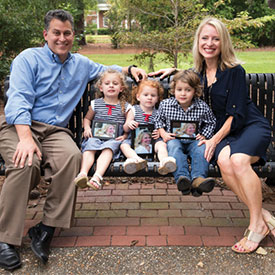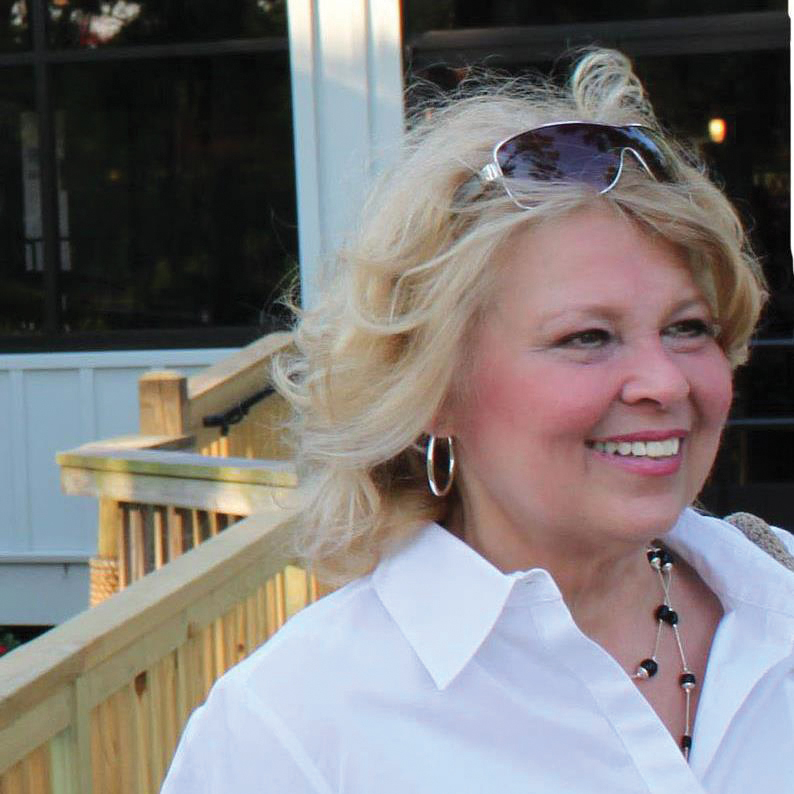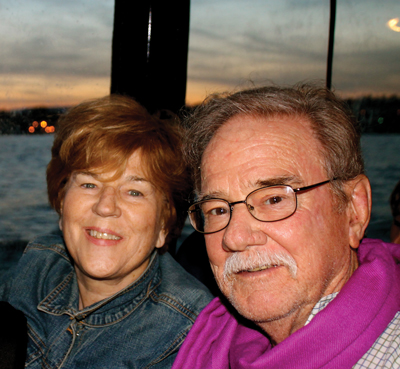 Robert and Casey Howard with their children, Eva, Ella, and Preston. Giving to basic science research is a demonstration of faith. Supporters of this critical part of the biomedical research pipeline know that the gradual accumulation of knowledge over years and decades is necessary to achieving breakthroughs in treatment. There are no guarantees that a particular avenue of investigation will lead to clinical application, nor how long it might take to develop an eventual treatment or therapy. Nonetheless, UAB is fortunate to have many philanthropic supporters with the long-range vision to recognize the critical importance of this fundamental research.
Robert and Casey Howard with their children, Eva, Ella, and Preston. Giving to basic science research is a demonstration of faith. Supporters of this critical part of the biomedical research pipeline know that the gradual accumulation of knowledge over years and decades is necessary to achieving breakthroughs in treatment. There are no guarantees that a particular avenue of investigation will lead to clinical application, nor how long it might take to develop an eventual treatment or therapy. Nonetheless, UAB is fortunate to have many philanthropic supporters with the long-range vision to recognize the critical importance of this fundamental research.
Families Honor Loved Ones lost to Lung Disease
Two recent gifts to the Division of Pulmonary, Allergy, and Critical Care Medicine support research into idiopathic pulmonary fibrosis (IPF), a devastating disease in which tissue deep in the lungs becomes thick and stiff, or scarred, over time. As the lung tissue thickens, the lungs can’t properly move oxygen into the bloodstream, depriving the brain and other organs of oxygen.
 Cynthia Howard, whose struggle with IPF inspired a gift to research at UAB.IPF affects more than 100,000 people in the United States and five million people worldwide. “This disease is relentless,” says Victor J. Thannickal, M.D., the Ben Vaughan Branscomb Chair of Medicine in Respiratory Disease and director of the Division of Pulmonary, Allergy, and Critical Care Medicine. “The median survival rate is less than three years, and only 20 percent of patients survive five years beyond diagnosis.”
Cynthia Howard, whose struggle with IPF inspired a gift to research at UAB.IPF affects more than 100,000 people in the United States and five million people worldwide. “This disease is relentless,” says Victor J. Thannickal, M.D., the Ben Vaughan Branscomb Chair of Medicine in Respiratory Disease and director of the Division of Pulmonary, Allergy, and Critical Care Medicine. “The median survival rate is less than three years, and only 20 percent of patients survive five years beyond diagnosis.”
Robert Howard, associate vice president and deputy chief information officer for UAB Information Technology, and his wife, Casey, have established the Cynthia Howard Endowed Support Fund for Idiopathic Pulmonary Fibrosis Research in honor of Mr. Howard’s mother, who passed away from IPF at age 59 in 2012.
“My mom was all about people reaching their full potential,” Mr. Howard says. “When I got the job at UAB, my wife and I wanted to help support this important research in some small way. We also wanted to begin our tenure at UAB and in Birmingham giving back to the community. We want to raise our children with the mindset that we should give back and serve the community in which we live. We want to honor my mom. We want to help end this horrific disease and spare other families the grief of losing a loved one too soon. With all these things in mind, we dug deep and committed to fund the endowment.”
 Susan Goodwin with her husband, Gary, in 2014. Susan's gift to research honors Gary's faith and courage in the face of IPF.Susan Godwin of Fairhope lost her husband, Gary, to IPF in December 2015; he was 72 years old. After receiving the diagnosis in September 2009, the Godwins began researching IPF programs and learned that UAB is a leading IPF research and clinical care site. “Gary’s first clinical appointment was with Victor Thannickal,” Mrs. Godwin says. “We had read about Victor online prior to that and learned he was doing significant research in IPF, so we were very interested in that.”
Susan Goodwin with her husband, Gary, in 2014. Susan's gift to research honors Gary's faith and courage in the face of IPF.Susan Godwin of Fairhope lost her husband, Gary, to IPF in December 2015; he was 72 years old. After receiving the diagnosis in September 2009, the Godwins began researching IPF programs and learned that UAB is a leading IPF research and clinical care site. “Gary’s first clinical appointment was with Victor Thannickal,” Mrs. Godwin says. “We had read about Victor online prior to that and learned he was doing significant research in IPF, so we were very interested in that.”
Mr. Godwin received a lung transplant at UAB in September 2010. He later wrote and published a book about his transplant journey, Transplanting Faith, in hopes of educating and inspiring those suffering from pulmonary disease or in need of an organ transplant.
In memory of her husband’s courageous battle with the disease, Mrs. Godwin has established the Gary and Susan Godwin Endowed Research Fund for Idiopathic Pulmonary Fibrosis Research. “We’re coming up on seven years that we’ve had this incredibly meaningful and valuable relationship with UAB,” Mrs. Godwin says. “One of Gary’s comments any time we went there was he felt like we’d been to church, because of everyone’s kindness and compassion and dedication. We were very impressed by that every time we went there. So that’s a large part of the motivation for creating the fund for research.”
Research in Dr. Thannickal’s laboratory targets myofibroblasts, cells responsible for wound healing in the body. In healthy tissues, myofibroblasts assist with wound repair and then die in a process known as apoptosis. Fibrosis involving the lungs or other organs occurs when myofibroblasts fail to undergo apoptosis, resulting in a persistent repair process. This causes scarring and stiffening of the surrounding tissue, promoting the creation of even more scar tissue—a vicious and deadly cycle of nonresolving repair.
“We are extremely grateful to Robert and Susan for their generous gifts to advance IPF research," says Thannickal. “UAB has been a leader in this area of research the past several years, and our group is actively studying novel strategies to treat this devastating disease. UAB is also a referral center for the care and management of IPF, with patients coming from all parts of Alabama and surrounding states in the Southeastern United States. These gifts will serve to not only advance the science and understanding of IPF, but ultimately, the care of patients afflicted with this disease.”
Partnering to Defeat Breast Cancer
 BCRFA President Kate Kiefer formally presents the 2016 gift to Cancer Center Director Edward Partridge.In February, the Breast Cancer Research Foundation of Alabama presented its largest gift to date—$775,000—to the UAB Comprehensive Cancer Center. BCRFA has donated more than $5.8 million to UAB since its inception in 1996.
BCRFA President Kate Kiefer formally presents the 2016 gift to Cancer Center Director Edward Partridge.In February, the Breast Cancer Research Foundation of Alabama presented its largest gift to date—$775,000—to the UAB Comprehensive Cancer Center. BCRFA has donated more than $5.8 million to UAB since its inception in 1996.
“We are extremely thankful for this very generous gift,” says Edward E. Partridge, M.D., Evalina B. Spencer Chair in Oncology and director of the UAB Comprehensive Cancer Center. “Although we have made significant progress against the fight against breast cancer, sustained funding is critical to continued progress. The longstanding partnership between the BCRFA and the Cancer Center provides UAB investigators with the resources to accelerate discovery and translate new knowledge into meaningful therapies for all types of breast cancer.”
The BCRFA provides pilot funding for a wide array of cancer research projects, including basic, translational, and clinical breast cancer research. “We choose to invest in basic research because it is the groundwork for future translational research, which in turn develops new treatments for battling breast cancer,” says BCRFA Executive Director Elizabeth Bradner. “Taking a comprehensive approach to the research we support, whether it is basic, translational, or clinical research, will help us achieve our mission: To help find a cure for breast cancer by funding promising breast cancer research and raising community awareness and funding for that research.”
The BCRFA is currently funding research into how a patient’s immune system interacts with breast cancer tumor cells. This is a collaborative effort between researchers from multiple areas, including Albert F. LoBuglio, M.D., Donald J. Buchsbaum, Ph.D., Andres Forero, M.D., Troy D. Randall, Ph.D., and Amy Weinmann, Ph.D. Their research focuses on how to control gene expression of proteins in tumor cells and how the body recognizes the protein and can best attack cancer cells. More details on the BCRFA may be found at BCRFA.org.
By Jane Longshore